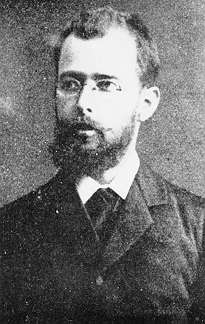Friedrich Kluge

Friedrich Kluge (21 June 1856 – 21 May 1926) was a German philologist and educator. He is known for the Kluge etymological dictionary of the German language (Etymologisches Wörterbuch der deutschen Sprache), which was first published in 1883.[1]
Biography
Kluge was born in Cologne. He studied comparative linguistics and classical and modern philologies at the universities of Leipzig, Strasbourg and Freiburg. As a student his instructors were August Leskien, Georg Curtius, Friedrich Zarncke and Rudolf Hildebrand at Leipzig and Heinrich Hübschmann, Bernhard ten Brink and Erich Schmidt at the University of Strasbourg.[2]
He became a teacher of English and German philology at Strassburg (1880), an assistant professor of German at the University of Jena in 1884, a full professor in 1886, and in 1893 was appointed professor of German language and literature at Freiburg as a successor to Hermann Paul.[2]
A Proto-Germanic sound law that he formulated in a paper in 1884[3] is nowadays known as Kluge's law.
He died in Freiburg.
Works
- Etymologisches Wörterbuch der deutschen Sprache (1881; 10th edition, 1924; 25th edition, 2011).
- Stammbildungslehre der altgermanischen Dialekte (2d edition, 1899).
- Von Luther bis Lessing, sprachgeschichtliche Aufsätze (4th edition, 1904).
- Angelsächsisches Lesebuch (3d edition, 1902).
- Deutsche Studentensprache (1895).
- English Etymology, in collaboration with Frederick Lutz (1898).
- Rothwelsch, Quellen und Wortschatz der Gaunersprache (1901).
- Mittelenglisches Lesebuch, glossary by Arthur Kölbing (1904; 2d edition, 1912).
For Hermann Paul's "Grundriss der germanischen Philologie" he wrote "Vorgeschichte der altgermanischen Dialekte" (1897) and "Geschichte der englischen Sprache" (1899).[4][5] In 1900 he founded the journal "Zeitschrift für deutsche Wortforschung".[6]
Notes
- ↑ Etymologisches wörterbuch der deutschen sprache, von Friedrich Kluge HathiTrust Digital Library
- 1 2 Kluge, Friedrich In: Neue Deutsche Biographie (NDB). Band 12, Duncker & Humblot, Berlin 1980, ISBN 3-428-00193-1, S. 140 f.
- ↑ Kluge, Friedrich. 1884. “Die germanische consonantendehnung ”. Paul und Braune Beiträge zur Geschichte der deutschen Sprache und Literatur (PBB), 9. S.149-186.
- ↑ Vorgeschichte der altgermanischen dialekte Google Books
- ↑ Geschichte der englischen Sprache by Friedrich Kluge
- ↑ Zeitschrift für deutsche Wortforschung SearchWorks Catalog
References
- Portraits of Linguists and their studies in the area of the Old Germanic Languages
 Rines, George Edwin, ed. (1920). "Kluge, Friedrich". Encyclopedia Americana.
Rines, George Edwin, ed. (1920). "Kluge, Friedrich". Encyclopedia Americana.